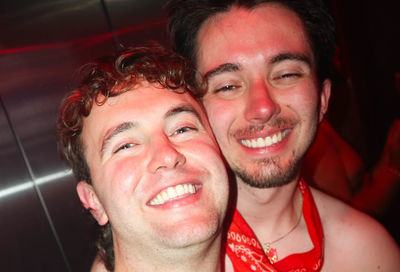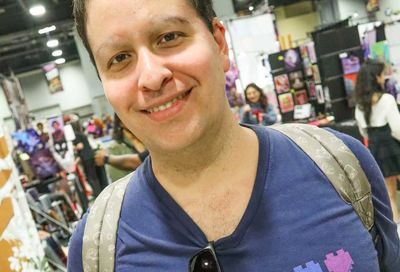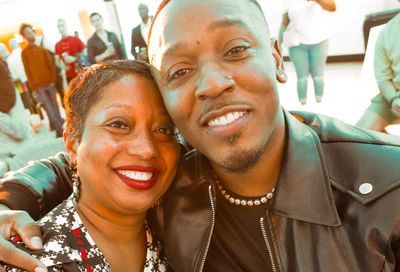Schwartz: An “Abomination” If I’m Left Out of Debates
As field for mayor's race takes shape, so does the question of who may debate, when, and where

With the Aug. 6 filing deadline for candidates to declare their candidacy behind them, some D.C. mayoral contenders are raising the issue of debates – specifically, who will be allowed to participate, as well as how many, and where and when such events will take place.
Independent candidate David Catania, who turned in more than 7,000 petition signatures from registered District voters — more than the 3,000 required to earn a slot on the November ballot — attacked rival Muriel Bowser, the Democratic Party’s nominee, soon after filing his declaration of candidacy and turning in the signatures. According to The Washington Post, Catania accused Bowser of trying to avoid debates, saying, “I think it’s clear that Ms. Bowser’s strategy is to avoid any public discussion of the issues until the last possible moment.”
Catania’s campaign has carried out this line of attack since Bowser first won the Democratic primary in April, seeking to paint Bowser as a lightweight and afraid of “vigorous debate.” Bowser’s campaign, in turn, has maintained it will not debate until the ballot is set, with Bowser previously saying — erroneously, as she excluded the Statehood Green and Libertarian Party nominees who had already earned a spot on the ballot by winning their own primaries — that she was the only candidate in the mayoral race. But using that criteria pushes the date of any debate or community forum that would allow voters to ask questions of the candidate further back, to September, at the earliest. Even now, after the deadline for independent and non-partisan candidates to file has passed, it will be another month before the ballot is finalized, as D.C. residents or others unofficially affiliated with other mayoral campaigns, may choose to challenge the validity of the signatures gathered by rival candidates.
Both Bowser and Catania are scheduled to participate in a Sept. 18 debate hosted at American University (AU), moderated by NBC4 personality Tom Sherwood and with a panel featuring representatives from the Post and American University’s radio station WAMU (88.5 FM). But other candidates are starting to question whether they will be given an equal chance to let voters hear their views.
Carol Schwartz, a former Councilmember running as an independent, told Metro Weekly that she has note been invited to any debates, including the one at AU.
“I guess my invitation must have gotten lost in the mail,” she said jokingly.
Schwartz, who turned in more than 6,500 petition signatures, nearly as many as Catania, insists that she is politically viable and that voters and pundits underestimate her — and voters loyal to her — at their peril.
“We had 72 volunteers helping to gather signatures,” Schwartz said. “We didn’t call them, they called us. I got 94,000 votes when I ran for Council in 2004. Even in 2008, when I lost, there were almost 40,000 people who wrote in my name in the general election, because I had lost the primary. It would be an abomination if I’m not invited to participate in the debates.”
Bruce Majors, the Libertarian Party nominee, said he had not been invited to any debates either, even though the Libertarian Party is considered a legitimate political party in the District, which entitles its candidates to appear on the ballot as the party’s duly nominated representative. Majors said he would like to be included in any debates, even though he doesn’t believe they are successful in swaying voters’ decisions. He told Metro Weekly that he, and many of the other Libertarian candidates running on the party’s slate with him, would rely on knocking on doors, making face-to-face contact with voters and online outreach through Facebook ads to get their message across.
Jude Crannitch, the campaign manager for Statehood Green Party nominee Faith, said his candidate would also like to be included in the debates, but has also been snubbed by debate organizers. Crannitch said Faith’s campaign has not received any invitations to participate in any forum related to the mayor’s race, but expected that there would be more opportunities in September, when the campaign picks up. Both Majors and Crannitch said they did not know what criteria were being used to determine whether the Greens or the Libertarians were going to be invited or excluded from a debate or forum.
A sixth candidate, Nestor Djonkam, running as an independent, also appears to have made the ballot, although he only turned in 239 more signatures than were required to gain ballot access, making him more vulnerable to a potential challenge than Catania or Schwartz. He also told Metro Weekly that he welcomed the idea of participating in debates or forums hosted by local community organizations.
Typically, third-party candidates are often asked to demonstrate political viability by reaching a predetermined threshold, such as polling above 10 percent in public polls, before being allowed to participate in debates, as Libertarian Robert Sarvis was required to in last year’s gubernatorial race in Virginia. In many cases, one or both of the two leading candidates may lean on debate organizers to take a strict view of viability to try and exclude third-party candidates.
But polls of D.C. voters are few and far between, and any such threshold would likely be too high for non-Democratic candidates to meet, given the overwhelming concentration of registered Democrats in the city. On the other hand, simply being outnumbered by Democrats does not invalidate the legitimate views of governance held by minor-party or independent candidates, so another measure would likely have to be used, thus leaving it up to the discretion of debate or forum organizers.
Joaquin McPeek, a spokesman for the Bowser campaign, said the campaign has always maintained that it will engage in debates once the ballot is set, and has not placed any demands on debate organizers seeking to restrict or exclude any candidates from participating.
“We have been consistent since day one that once the ballot is set, we would debate every politician who has qualified for the ballot,” McPeek said.
A spokesman for the Catania campaign was not immediately available for comment.
Support Metro Weekly’s Journalism
These are challenging times for news organizations. And yet it’s crucial we stay active and provide vital resources and information to both our local readers and the world. So won’t you please take a moment and consider supporting Metro Weekly with a membership? For as little as $5 a month, you can help ensure Metro Weekly magazine and MetroWeekly.com remain free, viable resources as we provide the best, most diverse, culturally-resonant LGBTQ coverage in both the D.C. region and around the world. Memberships come with exclusive perks and discounts, your own personal digital delivery of each week’s magazine (and an archive), access to our Member's Lounge when it launches this fall, and exclusive members-only items like Metro Weekly Membership Mugs and Tote Bags! Check out all our membership levels here and please join us today!






















You must be logged in to post a comment.